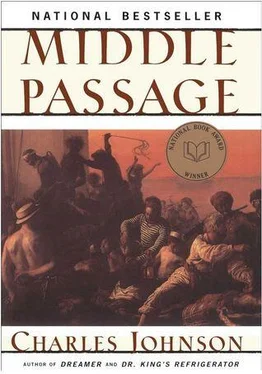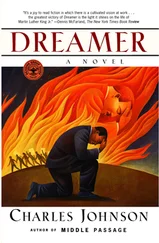I realized that I held that card. Before doing anything, though, I needed to rest. To return to the galley I was forced to maneuver slowly aft over and around human and nautical debris sprawled at the ship’s waist, larboard side. The storm had flooded berths below. So several hands brought their gear topside to bed down in the open air beside slave women and the children. Cluttered with bodies, wooden crates blown apart earlier, their contents strewn every which way, and draped with dangling sheets of sail, the sunken portion of the Republic from tiller to stern felt like a makeshift refugee camp, a smelly, chaotic strip of shantytown where the injured and ailing were tossed helter-skelter together. In mist-softened light mutineers, Africans, and able seamen could not be distinguished. Brief as this moment might be, no stations were evident among the ship’s company. Could these people slay one another after sunrise, as some planned? It hardly seemed possible. Or necessary. On the water, leagues from culture or civilization, I saw no point in our perpetuating the lunacies of life on land. Just for a spell the sea had swept some of that away. No one had the strength to sustain idols of the tribe or cave. Even the caged chickens were tired. Every so often walls of spray faffled on deck, much in the fashion of showers I remembered in New Orleans during the spring that were refreshing and brief, and just as suddenly were gone. Our sails were asleep. Beneath a damp blanket McGaffin slept beside the cabin boy. A Chinese mate and Ngonyama, who was officer of this night’s watch, bandaged the arm of a boat-puller bruised during the storm. Cringle dozed with Squibb’s parrot on his left shoulder. His back was against the topgallant rail, both his eyes shuttered, and his head all on his right shoulder. I saw he was sweating. The armpits of his coat were stained, which was odd. Things were cooler now at eight bells and, since Meadows had left the pens, quiet but for an occasional cough and the sound of the ocean, spongelike in the way it absorbed, even trivialized, the noises we made. Crew and cargo, so exhausted — by events and their own fierce emotions — appeared content to lie together a while in various postures of fatigue, barely lifting a finger, as if they were frozen, or maybe soldiers who had fallen after a battle, too drained and dead of brain to do anything more than listen to their own lungs; and the frail, in-and-out sigh in each man’s chest was only the faintest of notes beside the brooling waves and wind of the Atlantic.
I came through the hatchway, holding the tray in front of me with one hand. Squibb, resting on the galley table, roused awake when he heard me, swung his feet over the side, and blew the overhead lantern back into brilliance. Stretching wide like a bear, then yawning, he placed his left palm over his lips. “Sounded like the storm put a scare into them dogs.” I decided to say nothing about the dogs; Meadows had not included Squibb in that. Then my eyes drifted to the corner and Baleka, beautifully disheveled in her sleep. In her left hand she was holding an empty wineglass, one of Falcon’s, from which she enjoyed drinking water or goat’s milk in imitation of the ship’s brain-sotten crew. As with other children I’d seen, she looked boneless in sleep, her body limp, one hand (the right) on her brow like a society woman about to swoon. But she wasn’t breathing right. When I bent to brush my lips on her brow, I saw dark spots on her cheeks.
“She’s a bonny lass,” said Squibb. “I didn’t want to put too many covers on her.”
“Guess not,” I said. “She’s burning up. Did she wake while I was gone?”
“Once. I give her a glass of milk. Listen, Fletcher come down heah a minute ago and gimme his sea chest. Said he wouldn’t need it anymore, seeing how it was the end of the world. He was scratchin’ a coupla spots on his arm like the ones on her. I think she give all them boys somethin’ when they was heah. How yuh feelin’, Illinois?”
“I feel I’ve been on this boat so long my toes are growing webs between them. .”
Squibb cautiously let his tone lighten to console me. “Sometimes the slaves bring their sickness with ’em. They won’t last that long. We’ll live to see worse and tell about it. Still”—he winked—“it wouldn’t hurt, I suppose, if you’ve made out yer will. Yuh got family back in Makanda?”
“A brother, if you can call him that.”
He noticed the wobble that came into my voice whenever I spoke of Jackson, and he paused. “Bad feelin’s between yuh, eh.”
“You could say that.”
“Well, that’s a shame, ’specially since yer kin’s liable to get anythin’ yuh leave.”
The thought made me laugh, painfully. “You don’t know him. Because of him I’ve got nothing to leave, Josiah.”
“He cheat yuh out of it?”
“In a way.”
When I said no more, he finally asked, “Yuh gonna tell me about it, or do I have to wait fer yer biography?”
“No.”
“Yuh’ll feel better, love. C’mon now. No point in carryin’ round old cargo like that. All along yuh been tellin’ people he betrayed yuh. Ain’t that so?”
“Me, yes — only me.”
“Didn’t treat yuh like a brother, yuh’re sayin’?”
“Yes. I mean, no! He treated everyone the same, and that was the trouble. Kin meant nothing to him. Do you remember that strange flower we saw in Senegambia? I forget what it’s called, but one of the chaps pointed out how lovely a scent it released when you admired it and held the petals close to your nose. And that when you didn’t notice at all and brought down your boot, it offered like a gift that same remarkable perfume. Do you remember?”
“Aye.”
“That’s Jackson.”
Squibb nodded. “Yuh think ’bout him a lot, don’tcha?”
“Too much. And each time it’s different. I go over what he did so often and from so many angles that it makes no sense anymore. He is like Ngonyama, or Baleka there. I didn’t know that until the skipper brought them on board. Hell, Squibb, he could be from their tribe, for all I know.”
“That’d make you one of ’em too, wouldn’t it?”
This I doubted. The more I thought on it, the Allmuseri seemed less a biological tribe than a clan held together by values. A certain vision. Jackson might well have been one of their priests. Against my better judgment, I let Squibb wheedle me into talking about Master Peleg Chandler, his will, and my day of manumission, which I remember right enough because we were the only family he had. He was a tobacco planter living on southern Illinois land his great-grandfather cleared himself, a painfully shy man from a long line of pious homesteaders, hardly a man to go in for politics, or even raising his voice in a conversation. His daughter, Maggie, died at seven from scarlet fever; his wife, Adeline, took a fatal spill from a horse. Thus, Jackson, who was Chandler’s nurse and aide since the time he could fetch and carry, and I stood to inherit everything he had. It was in the wind one morning — May 23, 1829—that he would be generous with his slaves for their years of devoted service. Among his holdings was a commodious, clean-timbered manor house, with sturdy pine furniture, heavy and square and still blond, and grounds that were beautiful in the springtime, bordered by berried woods and trees in bloom like half a hundred bouquets. Inside were glass-fronted bookcases, a quarter-turn stair with a landing space, and well-stocked cupboards in a kitchen full of DeGroot silverware. His stables were full of Morgan horses and Appaloosa; he had Berkshire and thin-rind hogs, and vast investments clear up to the state capital in Springfield. No, we hadn’t suffered all that badly, I’m almost ashamed to say, and Jackson was troubled by this too, for now it seemed we would never want, if he included us in his will, which I knew he would because my brother was all the good he thought there was in the world.
Читать дальше












